The mercury has been soaring in Delhi and doctors have warned that exposure to extreme heat can lead to a range of health issues -- from mild rashes and muscle cramps due to excessive sweating and salt loss, to serious conditions like heat exhaustion and heatstroke.

Delhi recorded its first heatwave of the season on Monday with the maximum temperature touching 40.2 degrees Celsius. The city is currently under a yellow alert, which will remain in place till Wednesday.
In the India meteorological department's colour code, a yellow alert stands for "be aware" and advises people to avoid heat exposure, wear lightweight, light-coloured and loose cotton clothes, and cover their heads.
Under these conditions, vulnerable groups such as children, the elderly, pregnant women, and individuals with pre-existing conditions such as cardiac or kidney disease are at a greater risk.
Dr Mukesh Mehra, senior director (Internal Medicine) at Max Super Speciality Hospital in Patparganj, said extreme heat can overwhelm the body's natural cooling system, leading to severe health consequences.
"Heatstroke, the most serious form of heat-related illness, occurs when the body temperature exceeds 104°F. It often manifests itself with symptoms such as confusion, dry and hot skin, rapid heartbeat, and even seizures. Other signs include dizziness, headache, nausea, and vomiting," he explained.
"In such conditions, vital organs like the brain and heart may be strained due to reduced cooling and redirected blood flow. Recognising these symptoms early and seeking immediate medical attention is essential to prevent life-threatening complications," Mehra added.
Rajat Sharma, a resident doctor of community medicine at UCMS and GTB Hospital, said exposure to extreme heat on days when temperatures are particularly high can cause a variety of health problems.
Apart from heat rash and muscle cramps caused by excessive sweating and loss of electrolytes, more serious conditions such as heat exhaustion can lead to dizziness, fatigue, heavy sweating, and nausea, he said.
The doctor explained that if not treated in time, this can escalate to heatstroke -- a life-threatening emergency where the body's temperature regulation fails, leading to confusion, loss of consciousness, and even death in some cases.
Doctors have advised people to stay well-hydrated, avoid stepping out during peak sun hours and wear light, breathable clothes. "If someone shows symptoms of heat-related illness, they should be immediately moved to a shaded or cooler place," Dr Sharma said.
Echoing similar concerns, Dr Mehra stressed the importance of preventive measures against heat-related illnesses.
"As heatwave conditions intensify, prevention is our best protection. Staying hydrated... supports the body's cooling system. People should limit outdoor activities during peak hours, take regular rest if working outdoors, and gradually acclimatize to rising temperatures," he said.
"Being aware of personal risk factors such as age, chronic illnesses, or medications can significantly reduce the chances of developing heat-related complications like exhaustion or stroke," Dr Mehra added.
Dr Ushast Dhir, the director of the Department of Liver Transplant and Hepatobiliary Surgery at Sir Ganga Ram Hospital, said that with the onset of summer, there is an increased risk of exposure to new viral infections and water contamination.
He cautioned that the elderly, children, and diabetics are at a higher risk of heatstroke and should avoid direct sun exposure, especially during the afternoon hours.
"With rising temperatures, the risk of dehydration also increases. We should stay hydrated with non-caffeinated fluids. Tea, coffee, and carbonated drinks can further dehydrate the body and should be avoided during peak summer months," Dr Dhir advised.
Delhi is likely to experience cooler days after April 10 with Skymet Weather Services Vice President Mahesh Palawat predicting cloud cover and a drop in temperatures due to a western disturbance over North India.
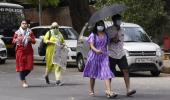
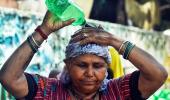
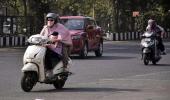
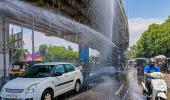
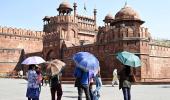






 © 2025
© 2025